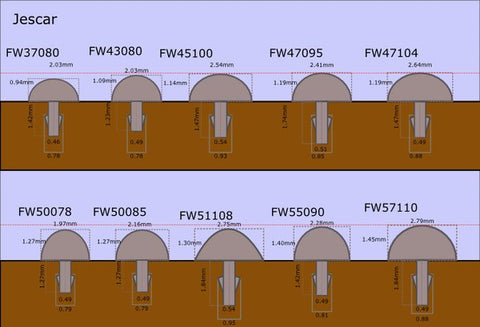While a plethora of companies manufacture fretwire these days, some are certainly more popular than others. Jim Dunlop, Jescar, Stew Mac, Sanko, and Polymet will all pop up with a simple google search and while there are plenty of others making frets out there, those mentioned are at the top of the heap and are the most popular with manufacturers and repair techs, alike.
Unfortunately, there is no agreed upon method for naming frets so each manufacturer has their own unique approach to this which often leads to confusion. Jescar leads the pack when it comes to logic by numerically naming each fret after its height and width. Simple! This makes it very easy to understand the size of the fret you are choosing. Dunlop has named their frets seemingly arbitrary numbers like 6150, 6105, 6120, etc, that don’t indicate their size but they do have size charts on the ready for any body looking for those all-important details. Sanko frets are manufactured in Japan so they are measured in millimeters. While Stew Mac uses terms like Narrow, Medium, and Wide to keep things even simpler.

Jescars method of naming frets sure makes logical sense!
While there are differences from brand to brand, they are all utilizing the T Fret design, and while the exact percentages of their alloy may differ from one another, they are all quite similar regarding their material content (until we get into substitute materials, of course). Personal note, I have played way more guitars than the average person thanks to working in shops for the last 20 years. I have never been able to tell who manufactured a fret wire once it was installed and crowned properly.

The Materials used to make Fret Wire
The original fret material? Bone. Yup, until strings turned to metal, thin strips of bone were used. While bone still makes one of the finest materials for a nut or a saddle, it’s a little soft to handle the rigorous job duties of a fret. If you want bone frets, just... stop it, you're being unreasonable :)
Brass Frets were used as well but mostly on instruments that used “gut” strings as the wear and tear is nowhere near as severe with those soft and light strings. Brass frets are still available but they are really only suitable for nylon strings.


Nickel Silver (aka German Silver) has long been the choice of manufacturers and luthiers alike. It’s typically 18% nickel and 80% copper for pliability (12% is also available but more rare). Used on acoustic, electrics, basses, mandolins, ukuleles, literally everything with frets, this material is hard enough to provide years worth of worry free play but not so hard that it adds a brash, brittle, or unmusical top end to an instruments tonal palette.

Stainless Steel is a material chosen for its exceptional hardness and ability to keep a shine. This material is so hard that it will wear out strings made of softer material rather quickly and even the tools used to install them! Many players, myself included, hear them adding a considerable brightness to any guitar. Though a good choice for someone with a nickel allergy (like me), some stainless steel can contain nickel. This ultra-hard material is so hard to work with, that many techs won’t work on them since they dull or ruin tools very quickly. FACT: we won’t put any Stainless Steel frets in our beloved Plek Machine as they are too hard for the cutting wheel!


Jescar’s EVO Fret material is made from copper and titanium. This Gold appearing alloy is harder than nickel silver and softer than stainless steel. So this material is much less prone to wear and tear AND… it still sounds great. To my ears and hands, EVO frets offer the best of both worlds. Also as someone with a searing nickel allergy, I highly recommend these frets, as I use them on all my builds.


These would be the most common materials available today. Jescar offers many of their sizes in Nickel Silver, Stainless Steel, and EVO. Dunlop offers Nickel Silver, Stainless, and Brass. I’m quite sure there are some other alloys available, as people always seem to be pushing the envelope, but I have yet to encounter them.
Now that you have all the knowledge you'll need to make an informed decision about the materials, let's get into which fret size is right for you...



Hi , this is a genuine enquiry for the new year -
What fret wire does a 1989 Rickenbacker 330 have ?
Does it come in alamunium ?
I want to refret this guitar / new nut set up – do you do this ? Can you do it specifically to Rickenbacker factory settings ?
What is the turnaround and cost ?